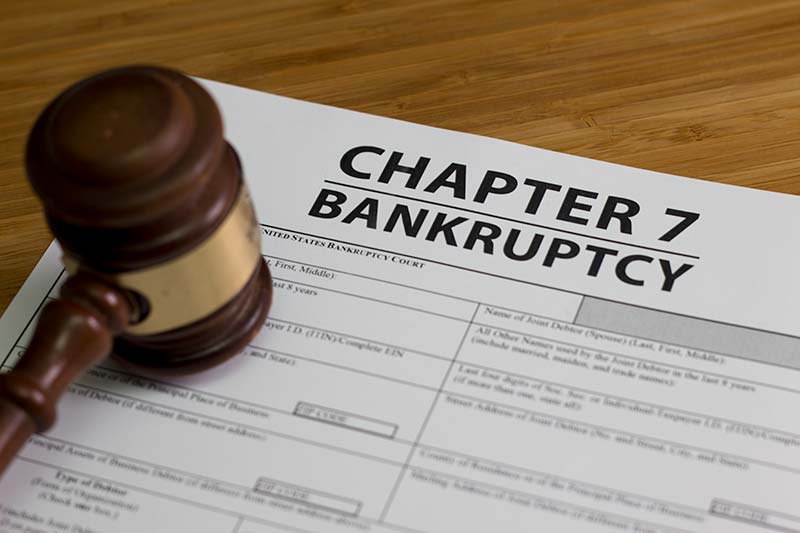Many Washington State citizens are experiencing financial difficulties right now. Some fear losing their home, others simply can’t pay their bills as they come due. Our federal government recognizes that in certain circumstances, people need a fresh start and a way to address their financial obligations.
Bankruptcy is an orderly, court-supervised procedure where a trustee takes over a debtor’s assets, reduces them to cash, and distributes payments to certain creditors. As an experienced bankruptcy attorney, I handle the two most common forms of bankruptcy — Chapter 7 and Chapter 13. In this article, we’ll explain the basics of a Chapter 7 bankruptcy filing. To learn more about Chapter 13 cases, take a moment to read this article.
Basic Bankruptcy Court Procedure
Before filing, the debtor must attend an online Pre-bankruptcy Credit Counseling session. This meeting includes a financial evaluation, discussion about bankruptcy alternatives, and formulation of a budget plan. To initiate a Chapter 7 bankruptcy case, the bankruptcy attorney files a petition on behalf of the debtor with supporting financial schedules, and proof of the counseling session. The debtor must file in the bankruptcy court that serves the area where the individual lives or where the business is located.
Once the initial petition is filed, an automatic stay goes into effect which stops most, but not all collection activities against the debtor. While the stay is in effect, your creditors cannot initiate or continue a lawsuit, garnish your wages, or even call you to demand payment. Also, after filing for bankruptcy the debtor must attend an online debtor education course to learn how to develop a budget, manage money, and use credit wisely.
Who is a Trustee, and What Does a Trustee Do?
The court appoints a trustee to monitor your case. Under bankruptcy law, a debtor may keep certain assets by claiming legal exemptions. If you file a Chapter 7 asset case, the trustee will determine how to liquidate your nonexempt assets to maximize the financial return to your creditors. If you file a Chapter 7 no-asset case, either because you have no assets or they are all exempt, there is no distribution to your creditors.
In most Chapter 7 bankruptcy cases, if the debtor is an individual, he or she will receive a discharge that releases him or her from personal liability for certain dischargeable debts. The debtor normally receives the discharge a few months after the petition is filed. Once discharged, the debtor has no legal obligation to pay the debts that were discharged.
Some debts are not discharged in Chapter 7 bankruptcy. For example, alimony and child support, some taxes, most government-funded educational loans, and a few other forms of debt are not discharged.
Filing bankruptcy will negatively impact your credit history and credit score for a while. In most cases, the Fair Credit Reporting Act limits credit reporting agencies from releasing negative information that is more than seven years old or reporting bankruptcies that are more than ten years old. You also may be prohibited from filing another bankruptcy until a certain amount of time has passed.
Do You Qualify to File Chapter 7 Bankruptcy?
If your income is greater than certain threshold limits, you may not be able to file for Chapter 7 debt relief. Washington State law establishes presumptive income thresholds depending on the size of your household, and the number of earners living there. As of April 1, 2020, the annual limits per earner in the household are as follows:
Family Size
- 1 Earner: $67,511
- 2 Earners: $80,251
- 3 Earners: $92,568
- 4 Earners: $107,481
These income amounts can change yearly so it is important to understand the current requirements under the bankruptcy laws. The Bankruptcy Code is complex and changes frequently. We recommend retaining a qualified bankruptcy attorney to help you navigate the complexities of the bankruptcy system.
Gregory L. Davies is an experienced bankruptcy attorney who handles both Chapter 7 liquidations cases and Chapter 13 reorganization cases. He takes the time to understand his clients’ situations and explain how they can receive the financial relief they need.
If your debts are overwhelming you, call Davies Law at (425) 259-2755 or complete our simple form to set up an initial consultation to discuss your specific circumstances and how we can help. We also offer virtual meetings if you prefer.

